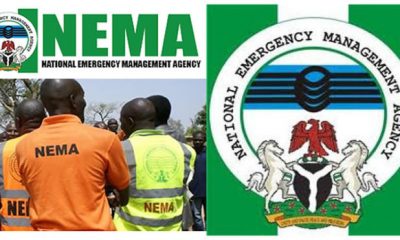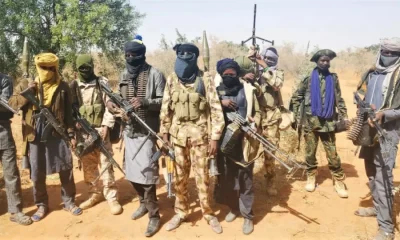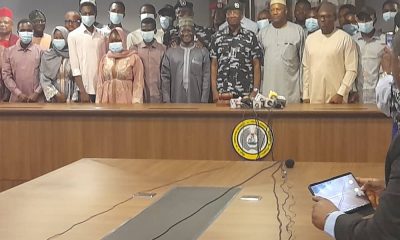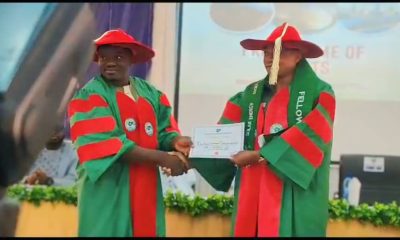POLITICS
A Minister’s Plea to Bandits and Buhari’s All’s Well Posture in London
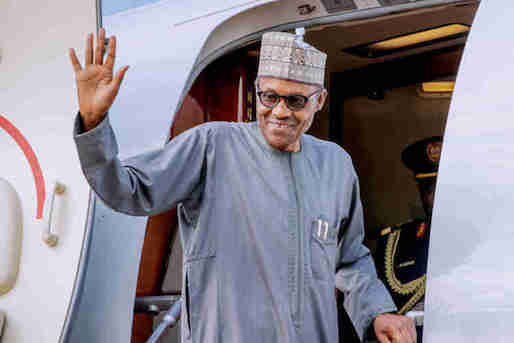
By Olabisi Deji-Folutile
Minister of State for Education, Emeka Nwajiuba, has shown the world Nigeria’s helplessness in dealing with the problem of the abduction of students by terrorists often referred to as bandits. Between December 2020 and now, more than 1,000 Nigerian students and school staff have been kidnapped and held for ransom in the North-West region of the country.
Over 500 of this figure were abducted in the last three months and the problem shows no sign of abating. Now, Nwajiuba is pleading with bandits to stop targeting schoolchildren. He has also begged them to free the abducted ones in their custody.He spoke as another set of three students of Bethel Baptist Secondary School in Kaduna, who were part of the 121 kidnapped on July 5, reportedly escaped from their abductors on Tuesday. The students were found by troops at the Kankumi forest general area in the Chikun Local Government Area of the State. So far, seven students have escaped from their abductors – four had earlier done so on Sunday, July 25. This is in addition to the first batch of 28 students that the kidnappers released. Over 80 students of the Bethel school are still in the forest at the moment.
Elated at the news of the students’ escape, Nwajiuba said, “This is the kind of news I want to be hearing every day. They should please return our children to us. I am so happy for these parents. So, I am really glad to have these three back and I think we should have all of them back. Please, any kind of help we can get. I appeal to parents to please bear with us.”
Yes. This is where we are. Things have degenerated to the level that those who still have conscience among our government functionaries now rejoice over a small number of students who escape from their kidnappers’ dens, even when hundreds of them are still in the dens of lions across the thick forests of Nigeria’s North-West. As I wrote this article, there are over 300 students who have not been returned to their families. I talk about conscience here because there are some people in government who can look at Nigerians in the face and tell them that the challenge of the abduction of students has been solved and that the ones in the forests are mere remnants of the handiwork of a defeated foe. After all, that is how they told us that Boko Haram insurgency has been defeated, when terrorists were still hoisting their flags and killing military personnel in the North-East almost on a daily basis.
Even as it is, I am not sure the junior Education Minister will not be reprimanded for talking too much. Aside urging the ‘bandits’ to leave Nigerian students alone, he also appealed to “whoever talks to them” to help tell them to “leave our schools alone.” I don’t know why the Minister refused to mention the name of the person who talks to them. We all know him. His name is Sheikh Gumi. He has been the official spokesperson for bandits in Nigeria. The cleric has spoken openly on behalf of the bandits and visited them in their hideouts, with pictures of such visits in the public domain. He has not hidden his relationship with them. So, appealing to him to beg the bandits doesn’t seem to be out of place.
Of course, as usual, the Minister tried to defend the Federal Government, saying it was doing as much as it could possibly do. “I know it is disheartening how you feel and I am appealing as one of the Ministers you have put in government that we take responsibility and we are doing the most we can on this matter,” he had said. But we all know that this defence is feeble. It is another way of paying lip service to the problem. Anyway, by now, the minister ought to know that the Federal Government’s best, apart from being poor, is far from being enough!
It seems this country just loves to go from bad to worse when it comes to poor indices. Kidnapping of students has grown from being an aberration to a lucrative business in our clime. What started as an aberration in Chibok has moved to Dapchi to Kagara to Jingali to Jangebe and so on, without any real form of check. How can criminals abduct over 100 students at once without being apprehended? How do they move these students – through trucks or do they trek? Or how do they operate so freely in a country that has 17 security and law enforcement institutions? Yet, none of the gangs has been arrested in the eight mass kidnappings of Nigerian students since December last year.
A senior analyst with the Tony Blair Institute for Global Change, Bulama Bukarti, quoted the Deputy Director of Nigeria’s intelligence agency, the Department of State Services (DSS) as saying that kidnappers have extorted N2 billion ($4.9 million) from ordinary Nigerians in the first six months of this year alone. Yet, our leaders prefer to beg criminals than make them pay for their crimes. They would rather subject innocent citizens to unnecessary hardship under the pretence of making the country secure, as witnessed in the ongoing compulsory registration for the National Identification Number. I don’t know what they want to achieve with this, when it is obvious that they aren’t using the basic technology that is available now to its full advantage. Or what do you make of a country that can’t deploy basic technology to track the numbers that kidnappers use to communicate with parents of abducted students, to find their location? I even learnt the people in the North do not have any emergency number to call when attacks are underway and that kidnappers now accept ransom payments through bank transfers!
Our Education Minister has not been the only one begging criminals. It’s just that he has expressed his views publicly. Many state governors have also been begging criminals to stop kidnapping citizens within their domains. I heard that in one of the peace meetings with the criminal gangs, which, by the way, had representatives of our security units in attendance, the leader of the bandits threatened to wreak more havoc and everybody, including the security representatives at the meeting, kept begging for mercy. The state governments are saying that they have minimal powers to do anything about physical security, since the security agencies essentially answer to the Federal Government. But the same governors will oppose a review of the Constitution to accommodate state police. Who is deceiving who?
As bad as it is for a government official to display cluelessness and helplessness in the midst of a gargantuan challenge, I think the Minister probably fared better when compared with the lacklustre performance of Nigeria’s President Muhammadu Buhari at the recently concluded global education summit in London, United Kingdom. At least, the Minister acknowledged our problem. The President’s outing was something else. Anyone who listened to his contributions at the summit would think Nigeria is an Eldorado, as far as its education sector is concerned.
Hosted by the U.K. and Kenya, the Global Education Summit brought together world leaders to make progress towards Goal 4 of the Sustainable Development Goals (quality inclusive education for all children). The centrepiece of the summit was the opportunity for leaders to make five-year pledges to support GPE’s work to help transform education systems in up to 90 countries and territories, where 80 per cent of the world’s out-of-school children live.
While leaders like Britain’s Prime Minister Boris Johnson and Kenya’s President Uhuru Kenyatta, were forceful and emotional about the challenges confronting the sector, emphasising the urgency required in tackling the problem of the underserved, unreached, as well as out-of-school children population across the globe, the President of Nigeria, where more than 10 million children are out of school, the highest figure in sub-Saharan Africa, spoke as if Nigeria had no challenge in this sector at all.
On the panel with Buhari were Presidents Nana Akufo-Addo of Ghana, Faure Gnassingbe of Togo, Uhuru Kenyatta of Kenya and Lazarus Chakwera of Malawi. Everyone spoke about the peculiarities of the education sector in their countries. All that our president could tell the world was that Nigerians were acutely aware of the priority of education, and parents were making sacrifices to ensure that their children and wards get educated. He said Nigerians already know that, “You can’t succeed outside your educational qualification. So, no Nigerian parent jokes with education, as they are aware that if their children missed the opportunity of being educated, they have missed a lot.”
If Nigerian parents truly know the value of education and are already doing their best in this area as the President claimed, why do we still have such a huge figure of out-of-school children in the country? Does it mean that such children don’t have parents? Did they just fall from the sky? Why are they not in school? I really don’t get the point that the President was making. Is it that Nigeria is too proud to accept its challenges or is it a case of delusions of grandeur? Whatever the case may be, I think the President should be reminded that almost everyone in Nigeria, except probably him and others in government, knows that Nigeria is not doing its best as far as its education sector is concerned.
We also know that the solution to our problem is very simple, provided our governments choose to be responsible. Majority of those in the criminal gangs operating in the North have never gone to school. Out of the over 10 million Nigerian children who are out of school, over 70 per cent of them are located in the North. I noted in my article of September 4, 2019 that Nigeria was breeding children of anger every day. That is still the case now. Investing in quality education is one of the ways to tackle the root causes of insecurity in Nigeria. The more out-of-school children we have, the more criminals, bandits, terrorists and other criminals we will see tomorrow. And the more half-baked education we provide, the more bad leaders we will produce tomorrow. Nigeria is suffering the consequence of being governed by educated illiterates today. The situation will grow worse, except the few educated ones in government choose to do things differently.
POLITICS
INEC Staff Welfare Association Warns Members Against Manipulating Election Results

The Abia Chapter of the INEC Staff Welfare Association (ISWA) has warned its members to uphold the integrity of the commission and guard against the culture of manipulating election results.
The Abia Chairman of the association, Mr Collins Eze, gave the advice at the group’s general meeting and end-of-year party in Umuahia.
Speaking in an interview with newsmen on the sideline of the ceremony, Eze said that the staff members were adequately aware of their enormous responsibility and should ensure free, fair and credible elections.
He said: “We have also told our colleagues that anywhere they find themselves they should make sure that they do the needful by ensuring transparency in the conduct of elections.
“We have always told them not to allow anybody to induce them with money to manipulate election results.
“I’m happy that they have been building the capacity of our colleagues on election processes.
“So, in the coming years, we won’t have any problem in ensuring free, fair and peaceful elections.”
He said that the end-of-year party was special as it afforded them the opportunity “to wine and dine together as well as thank God for sustaining them in 2024”.
Eze said that his leadership had introduced various means of assisting members in dire financial needs by providing platforms to solicit suppory for them.
He expressed gratitude to members for their support and cooperation, describing them as the “secret behind the success of this administration”.
He said that 34 of at least 350 staff members of the commission in the state retired from service in 2024.
According to him, the development has placed a huge financial burden on the association, in terms of their welfare and entitlement as members.
Report says that each member received a carton of tomato paste as Christmas gift from the association. (NAN)
POLITICS
Be Thankful APC Didn’t Probe Your Administrations, Okechukwu Tells PDP

A chieftain of All Progressives Congress (APC), Mr Osita Okechukwu, has told the Peoples Democratic Party (PDP) to be thankful to God that its 16-year administration was not probed by the successive APC-led governments.Okechukwu stated this on Tuesday in Abuja, while reacting to a statement by PDP congratulating Ghanaians for the conduct of free, fair and transparent general elections.
Report says that PDP had, in a statement, said that the verdict of the people of Ghana in the presidential election was a signal to the APC that its days were numbered. The party’s National Publicity Secretary, Debo Ologunagba, had said in the statement that the power of the people in Nigeria, just like in Ghana, would ‘surely prevail and end the APC’s oppressive rule’.This, he said, would “return Nigeria to the path of good governance, security, political stability and economic prosperity on the platform of the PDP in 2027.”However, in his reactions to Ologunagba’s statement, Okechukwu said that the PDP clan should thank God that former President Muhammadu Buhari and President Bola Tinubu, out of sheer statesmanship, had refused to probe ‘the 16 locus years of PDP administrations’.Okechukwu, a former Director-General of Voice of Nigeria (VON), described the 16 years of PDP administrations as ones full of squandering and lack of plan.He said that Nigeria had yet to recover from the humongous culture of impunity and trust deficit planted by PDP on the Nigerian soil.Okechukwu said corruption was among the culture of impunity, saying it governed the privatisation of Nigeria’s electricity value chain, a key element in the country’s industrialisation drive.“Another is the blatant rigging of the 2007 general elections which the foremost beneficiary, President Umaru Yar’Adua, out of good conscience and noble magnanimity, publicly acknowledged the malfeasance which characterised his victory,” he said.Okechukwu also mentioned what he called conscienceless sale of the legislative and ministerial quarters, the annual rentage of which, he said, was bleeding the country’s treasury.“Another one is the neglect of $23 billion Greenfield Refinery, which could have saved over $70 billion expended on importation of refined petroleum products and which simulated the economic hardship of today,” he said.On why, for nine years, the APC administration could not fix those challenges, he recalled the efforts made by the Buhari administration to reopen talks on the Greenfield Refinery which, according to him, the Chinese regrettably rebuffed.The former VON director-general said that Nigerians were not in a hurry to forget the deliberate breach of the rotational convention of president from the north to the south.He said that the country could not also forget the utter disregard for Section 7 of the PDP’s constitution which expressly mandated zoning.Okechukwu advised the PDP not to insult the sensibilities of Nigerians by assuming that citizens would easily forget how they were put in the harms way.He said that PDP should thank God that Buhari and Tinubu did not want to probe them, adding “that’s why Nigerians cannot decipher the difference between the two political parties.” (NAN)POLITICS
LG Administration Central to Democracy in Nigeria -Nwoko
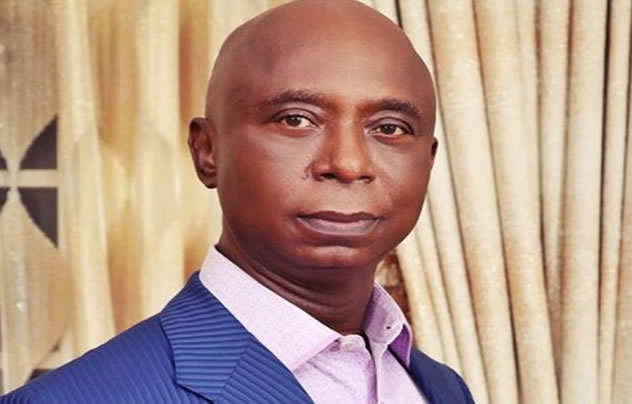
Sen. Ned Nwoko (PDP-Delta) says that Local Government Administration is central to democracy in Nigeria as it ensures grassroots governance and service delivery at the local level.This is contained in a statement signed by Dr Michael Nwoko, the Chief of Staff to the lawmaker in Abuja on Monday.Nwoko said this on the occasion of the presentation of an award “Icon of Hope” to him by the Association of Local Government Vice Chairmen of Nigeria (ALGOVC).
He was represented by his Chief of Staff. He said that the importance of local government administration in the country could not be overemphasised, as it was the bedrock of democracy.According to him, local governments in Nigeria play key roles in the country’s democracy by promoting participatory democracy, providing services, and representing citizens.“Local Governments help determine local needs and how to meet them. They also act as a link between the centre, state, and local people.“They are created to decentralise power and bring the government closer to the people. They perform both mandatory and concurrent functions.“It is in view of this that I took it upon myself to enhance the viability of local governments through the Paris and London club loan refunds,”he said.Dr Folashade Olabanji-Oba, ALGOVC National Chairman, while presenting the award at its 7th Annual National Conference, said the award was in recognition of the lawmaker’s significant contributions to strengthening local government administration.She highlighted Nwoko’s critical role in ensuring the Paris and London Club loan refunds, a financial breakthrough she said enhanced the capacity of local governments nationwide.(NAN)
